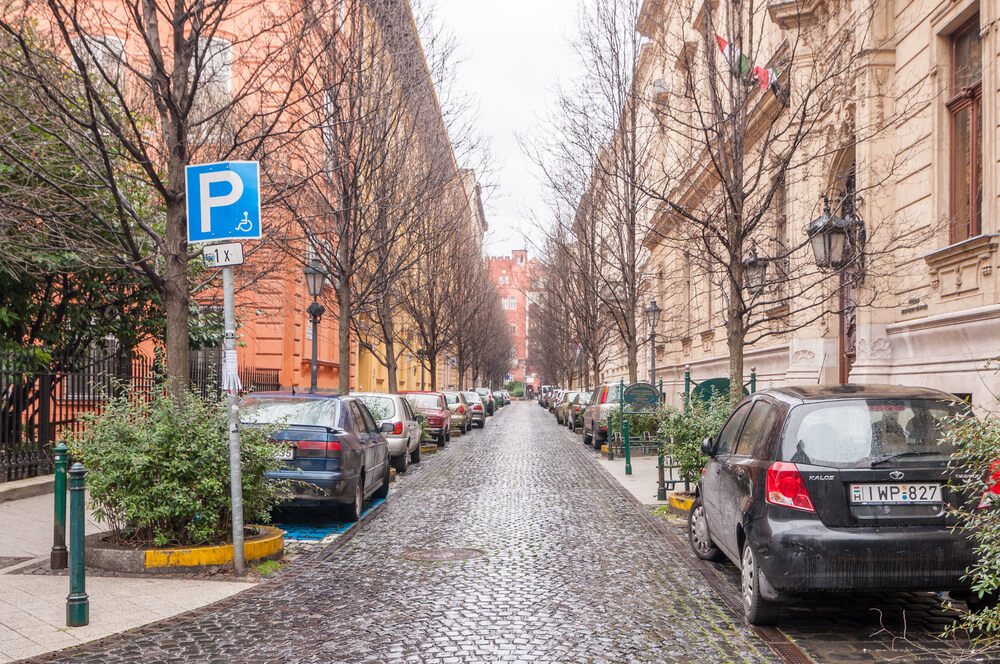Change language:
Breaking: Budapest to overhaul parking system – Fee hikes, new zones, and public transport incentives

Parking has become an increasing challenge in several districts of Budapest, with both residents and car-dependent commuters struggling to find spaces at almost any time of day. In response, the city government is introducing a series of measures aimed at encouraging more people to abandon their cars and embrace public transport. What exactly are these changes?
According to Telex, residential parking fees in Budapest’s District II will rise significantly, from HUF 25,000 (EUR 60) to HUF 50,000 (EUR 120) per year from 2025. The reform aims to tackle the district’s persistent parking congestion, exacerbated by the current system of low-cost parking permits. With 11,162 residential permits issued for just 8,865 available spaces, the imbalance has created considerable challenges.
To encourage residents to reconsider car ownership, the municipality is offering an annual BKK public transport pass worth HUF 100,000 (EUR 242) to those willing to give up their residential parking permits. To qualify for this incentive, residents must have a permanent address in the district. Additionally, pensioners and large families will benefit from reduced fees, paying only half of the new rates.

New parking zones and infrastructure upgrades
To further improve traffic flow, three exclusive parking zones will be established in busy areas: Hűvösvölgyi út, Szerb Antal utca, and Törökvész út. A third of the spaces in these zones will be reserved for residents during peak hours to limit commuter traffic from neighbouring areas.
In cooperation with Solymár, the district plans to build P+R (Park and Ride) facilities. Solymár will provide the land, while District II will finance the project. This initiative aims to deliver faster public transport connections for both local residents and those from the surrounding regions.
From spring 2025, the district will trial a new system to address illegal parking hotspots. Sixty sensors will be installed in accident-prone and frequently abused locations. These sensors will alert traffic wardens in real time to infringements, enabling faster enforcement.
Another measure will reclaim two-thirds of the parking spaces currently occupied by public companies, making them available for general use.

City-wide changes to Budapest’s parking system
Budapest as a whole will also undergo significant transformations to its parking system by 2027. Free parking for vehicles with green plates will be phased out, and traditional parking machines will be replaced by fully digital systems. According to Telex, discounts will be available for those using the BudapestGO app, although overall parking fees will increase, and parking in the city centre will be charged at weekends.
For instance, larger vehicles (over 1.8 tonnes) could face double parking fees, although this proposal is currently facing legal hurdles. The initiative aims to discourage the use of heavy vehicles in the city.
Several other important measures were approved during the General Assembly of Budapest, including the following:
Improvements to disabled parking: Spaces will be marked with blue paint, and traffic signs on narrow pavements will be reviewed to ensure better visibility.
Pedestrian-friendly improvements: Investments will be made to improve pavements and promote walking as a viable mode of transport.
Health proposals: A plan to create a network of specialist clinics was discussed but may face delays due to funding issues.
The Assembly also debated other issues, including a revision of the drugs strategy (which was ultimately rejected) and the approval of new social services under Gábor Iványi.
These sweeping changes aim to make Budapest a more sustainable, liveable, and transport-efficient city. While some decisions, such as fee increases, have been met with resistance, the long-term benefits of reduced congestion, improved infrastructure, and enhanced public transport accessibility could significantly improve daily life in the district and beyond.
Read also:
- Budapest’s parking crisis: Growing consensus that the city is no longer drivable
- Attention, users! BudapestGO app renews in November, new features available
Featured image: depositphotos.com








The war on private vehicle ownership continues, in full accordance with the globalist-socialist fascist Agenda 2030.